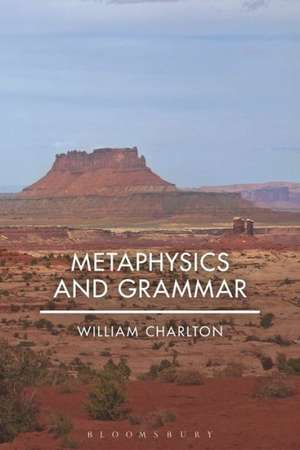Metaphysics and Grammar
Autor William Charltonen Limba Engleză Paperback – 7 mai 2014
Preț: 179.10 lei
Nou
Puncte Express: 269
Preț estimativ în valută:
34.28€ • 35.65$ • 28.68£
34.28€ • 35.65$ • 28.68£
Carte disponibilă
Livrare economică 22 februarie-08 martie
Preluare comenzi: 021 569.72.76
Specificații
ISBN-13: 9781472579300
ISBN-10: 1472579305
Pagini: 240
Dimensiuni: 155 x 231 x 20 mm
Greutate: 0.36 kg
Ediția:New.
Editura: Bloomsbury Academic
Locul publicării:London, United Kingdom
ISBN-10: 1472579305
Pagini: 240
Dimensiuni: 155 x 231 x 20 mm
Greutate: 0.36 kg
Ediția:New.
Editura: Bloomsbury Academic
Locul publicării:London, United Kingdom
Caracteristici
Familiarizes students with fundamental and recurring philosophical metaphysical questions
Notă biografică
William Charlton was Head of the Philosophy Department at Edinburgh University, UK. He has taught Humanity at Glasgow University and Philosophy at Trinity College, Dublin, Ireland. He is now retired.
Cuprins
1 Introduction2 How Metaphysics Arose3 Grammar and lexicography4 Wittgenstein and Chomsky on Grammar5 Truth and predication6 Existence and quantification7 Goodness, counsels and commands8 Change and tense9 Time and aspect10 Causation11 Materiality12 Thinking13 Saying14 ConclusionBibliographyIndex
Recenzii
William Charlton’s thesis that to understand the topics of metaphysics is to understand the grammar of our language sets him radically at odds with most contemporary metaphysics and most contemporary philosophy of language. The interest of his incisive and instructive book lies in the detail of his arguments. This is a book to be reckoned with.
I find it fascinating and full of insights . . . this book is always provocative, insightful, and original.
Wonderfully clear and engaging, Charlton's book is the first fully to expound the idea that problems of metaphysics are to be tackled through an understanding of grammatical constructions. Charlton discusses and also goes beyond predecessors such as Wittgenstein, by showing the importance of focussing on a precise notion of grammar, while he also engages with the thought of many living as well as ancient philosophers. Stimulating arguments and a pleasure to read.
Firmly rejecting current philosophical orthodoxy, with its science-inspired conception of ‘research’, Charlton’s lucid and carefully argued study makes a strong case for thinking the traditional problems of metaphysics are best handled by developing a proper understanding of how language works.
This lively and elegantly written book makes important suggestions on how to think about fundamental questions in metaphysics. It is not overly technical, so can be tackled by the interested amateur, but at the same time offers provocative thoughts, from which the professional philosopher could benefit.
William Charlton’s study of Metaphysics and Grammar is an original and provoking philosophical enquiry. Written in the clearest of styles, it gently attracts the reader to follow its argument as it successively examines the concepts that have been at the centre of metaphysical reflection during the last two millennia: truth, goodness, existence, change, time, and causation. The book’s central thesis is that these most abstract and fundamental concepts are properly understood as corresponding to grammatical constructions of natural language. Although deeply rooted in the history of philosophy (of which Charlton is a peerless expert), the book is eminently philosophical and engages in debates with the most authoritative contemporary philosophers.
Charlton’s scholarship is wide-ranging and eclectic, and his choice of examples is sometimes entertaining and surprising. His approach would be refreshing mainly for those already jaded by the excesses of contemporary analytic metaphysics. Summing Up: Recommended. Graduate students and researchers/faculty.
I find it fascinating and full of insights . . . this book is always provocative, insightful, and original.
Wonderfully clear and engaging, Charlton's book is the first fully to expound the idea that problems of metaphysics are to be tackled through an understanding of grammatical constructions. Charlton discusses and also goes beyond predecessors such as Wittgenstein, by showing the importance of focussing on a precise notion of grammar, while he also engages with the thought of many living as well as ancient philosophers. Stimulating arguments and a pleasure to read.
Firmly rejecting current philosophical orthodoxy, with its science-inspired conception of ‘research’, Charlton’s lucid and carefully argued study makes a strong case for thinking the traditional problems of metaphysics are best handled by developing a proper understanding of how language works.
This lively and elegantly written book makes important suggestions on how to think about fundamental questions in metaphysics. It is not overly technical, so can be tackled by the interested amateur, but at the same time offers provocative thoughts, from which the professional philosopher could benefit.
William Charlton’s study of Metaphysics and Grammar is an original and provoking philosophical enquiry. Written in the clearest of styles, it gently attracts the reader to follow its argument as it successively examines the concepts that have been at the centre of metaphysical reflection during the last two millennia: truth, goodness, existence, change, time, and causation. The book’s central thesis is that these most abstract and fundamental concepts are properly understood as corresponding to grammatical constructions of natural language. Although deeply rooted in the history of philosophy (of which Charlton is a peerless expert), the book is eminently philosophical and engages in debates with the most authoritative contemporary philosophers.
Charlton’s scholarship is wide-ranging and eclectic, and his choice of examples is sometimes entertaining and surprising. His approach would be refreshing mainly for those already jaded by the excesses of contemporary analytic metaphysics. Summing Up: Recommended. Graduate students and researchers/faculty.
